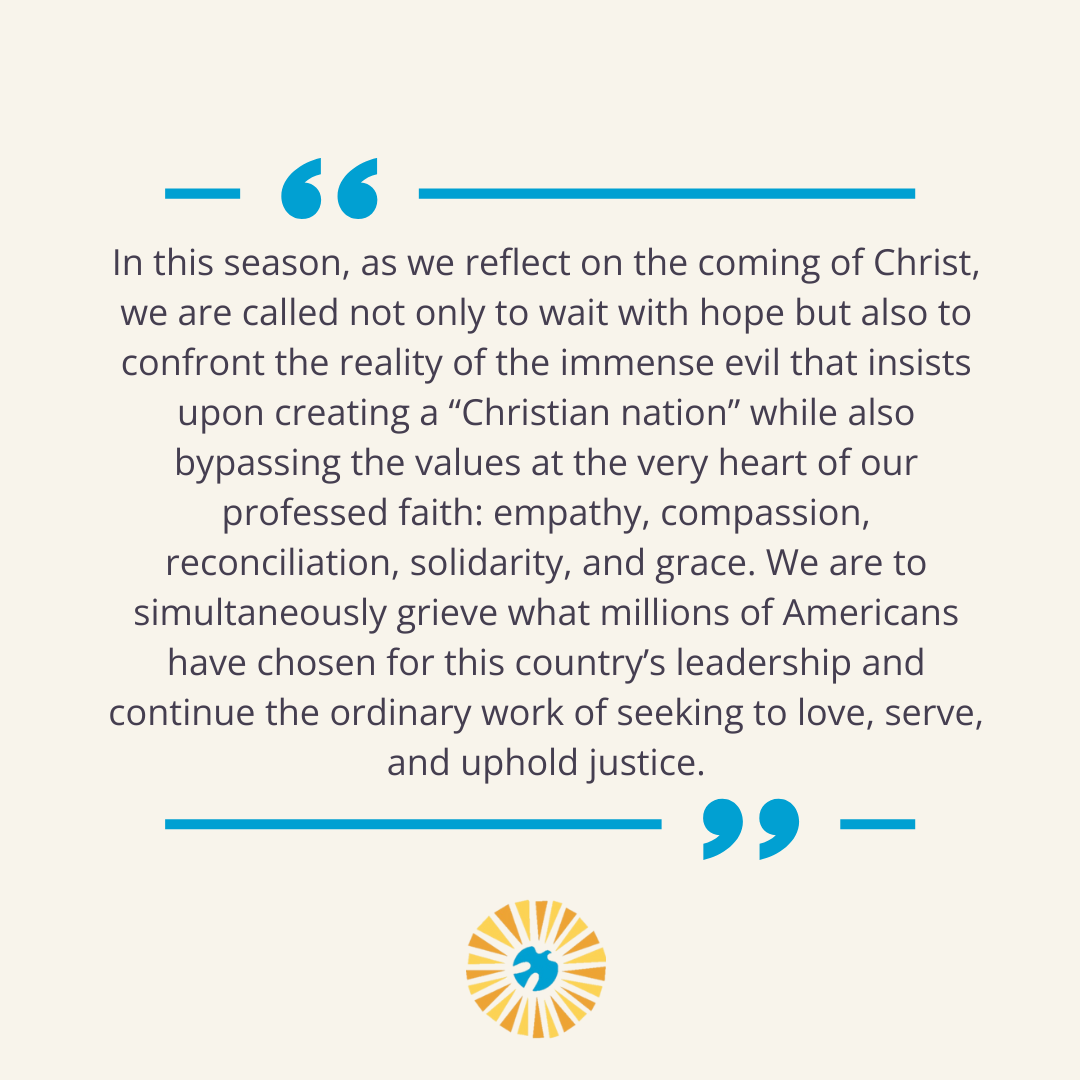Second Thursday of Advent
Gospel: Mt 11:11-15
The Kingdom Suffers Christian Nationalism:
I woke up on November 6th at around 4 AM with a hollow feeling in my chest. I had drifted off to bed before midnight after hours of watching The New York Time’s election needle while on the phone with my best friend. And sure enough, the outcome disturbed me far more than it surprised me.
Since 2016, I’ve watched Christians elevate Donald Trump to an almost mythical status. I’ve gaped at their posts on social media praising him as a man of God, proclaiming him the chosen vessel to bring the U.S. into a Golden Era. Like many of us, the election eight years ago left me with a faith crisis of epic proportions, wondering: how can other Christians justify worshiping a man who consistently espouses lies, stokes fear, and attacks the most vulnerable members of our society? How can they reconcile that with a Savior who, when given the power to dominate, chose the cross instead?
The same Christians that insist that the Bible should be taught in public schools have come to idolize a man who has broken nearly every single one of the Ten Commandments. His name is invoked alongside Scripture, his policies lauded as divine answers to prayers. I’ve asked myself, again and again, unable to ascertain a clear answer: how can those claiming to worship Christ—the humble servant, the Messiah who challenged the powerful and lifted up the lowly—willingly bend the knee to a man whose rhetoric is built on division, hatred, dehumanization, violence, and greed?
Matthew 11:11-14 warns us that the kingdom of heaven has always been under siege— not by the amorphous “world” or the so-called “secular culture”, but by the violent, self-serving forces found directly within the church. Christian nationalism, especially as we’ve seen it in recent years, is perhaps the most on-the-nose example of what it truly means to take God’s name in vain.
Insisting that male headship is God’s expectation for the church and the home, Christian nationalists choose to elect a man accused of sexual assault, who consistently talks about women in demeaning, disgusting ways. Rallying around the “pro-life” cause and unwilling to repent of the egregious sin of Zionism, they turn a blind eye towards the countless children that have been massacred for over a year in the genocide happening in Gaza. It isn’t hard to classify this hateful rhetoric, policies, and behavior as “love” when you stand just far enough away from anyone who is different from you. And so you begin to see the world through the lens of individual utility- for what it offers solely to you, but never to your neighbor.
This Advent feels heavy for me, and I’m wondering if it feels heavy for you, too. The season that should be full of hope and anticipation carries with it the weight of ongoing disillusionment, as the church, which claims to represent Christ, has yet again aligned itself with forces that contradict His very message. The church’s complicity in elevating the caricature of Christian nationalism far above the person of Christ has left many of us- myself included- struggling to see the Gospel as something that can actually carry meaning and significance in our contemporary era.
It’s okay to feel disillusioned. It’s okay to feel the tension between what the institutional church claims to adhere to in the abstract and what their “love” actually looks like. When we see a church more focused on domination than on advocating for the marginalized, more obsessed with wealth and power than with embodying the radical love of Christ, grief, confusion, and frustration are to be expected.
Advent is a time to wrestle with this tension. It’s a time to wait—not just for the birth of Christ, but for the transformation of our own hearts and that of the institutional church. This season doesn’t ask us to ignore the pain and disillusionment we are facing. Instead, it invites us to bring this brokenness to the manger, where we return to the Messiah who, each and every time, chose humility over power, love over violence, and sacrifice over control.
In this season, as we reflect on the coming of Christ, we are called not only to wait with hope but also to confront the reality of the immense evil that insists upon creating a “Christian nation” while also bypassing the values at the very heart of our professed faith: empathy, compassion, reconciliation, solidarity, and grace. We are to simultaneously grieve what millions of Americans have chosen for this country’s leadership and continue the ordinary work of seeking to love, serve, and uphold justice.
This Advent, let our disillusionment be a reminder that we are waiting for a King who reigns in love and humility, a kingdom that is not bound by the rhetoric and policies of a fraudulent, incompetent political idol but that transforms us from within, through the radical testament of Christ’s love.
Julia Morrow is a 2024 Re/Gen cohort member.


